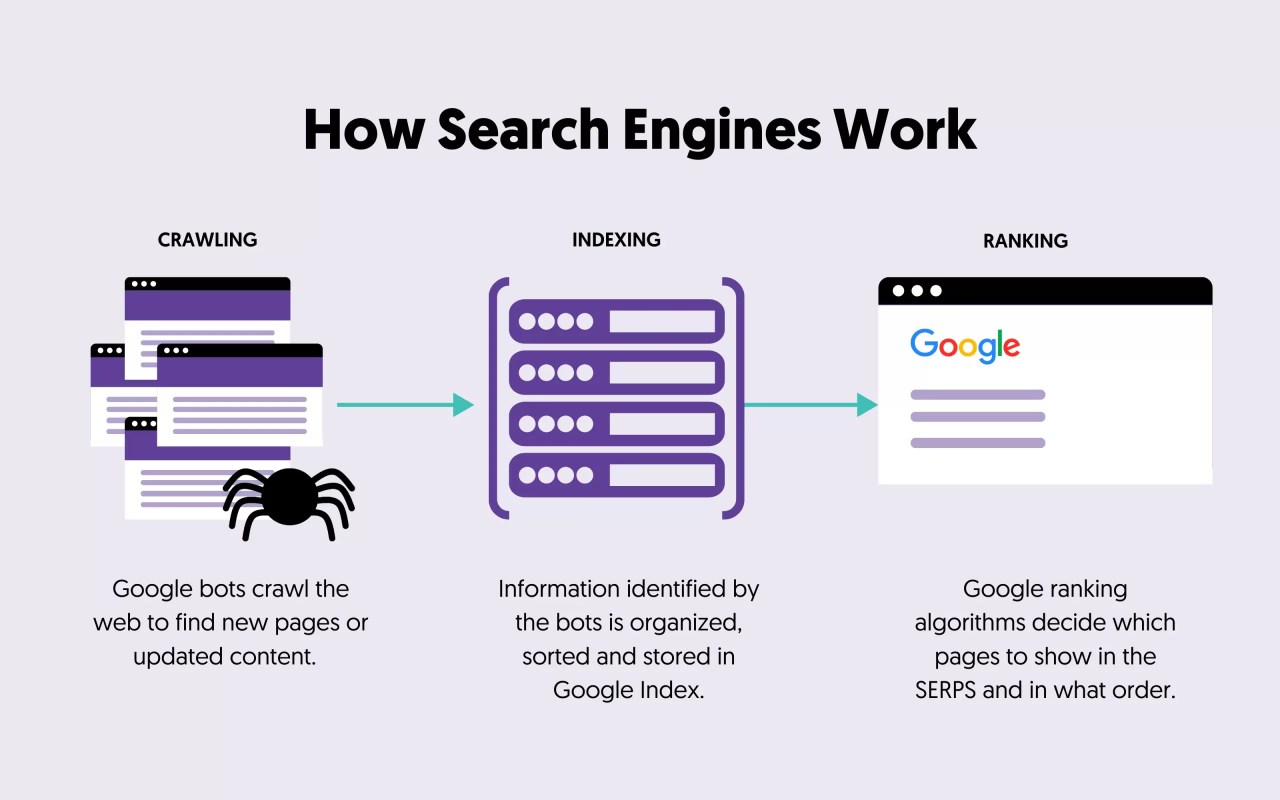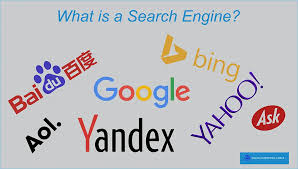What is a Search Engine:- In the modern digital world, search engines play a vital role in how we access information, navigate the internet, and interact with technology. Whether you’re finding a recipe, researching a topic, shopping online, or looking for nearby services, search engines make it possible.
This article provides a complete and in-depth guide to understanding what a search engine is, how it works, its history, types, uses, and its influence on our digital lives.

1. 🧠 Introduction
The internet is an ocean of information, and search engines are the ships that help us navigate it. Without search engines, finding the right information would be nearly impossible. Today, names like Google, Bing, and Yahoo have become part of our daily vocabulary — but what actually powers them? Let’s explore.
2. 🔍 What is a Search Engine?
A search engine is a software system designed to carry out web searches. It helps users find information on the internet by entering keywords or queries.
When you type a question or topic into a search bar (like Google), the search engine searches its database (called an index) to bring you the most relevant pages.
🔑 Key Features:
- Search box to enter queries
- Algorithms that process and rank results
- Web crawlers (bots) that scan the internet
- Indexed database of web content
- Search results page (SERP) that displays the output
In simple terms:
A search engine is like a digital librarian that helps you find the exact book (webpage) you need from billions of options.
3. 📜 History of Search Engines
Search engines have come a long way since the early days of the internet.
📅 Timeline of Evolution:
- 1990 – Archie: The first search engine that indexed FTP archives.
- 1993 – Excite: One of the first to index large parts of the web.
- 1994 – Yahoo!: Initially a directory, later became a full search engine.
- 1996 – AltaVista: Famous for its fast search and large index.
- 1998 – Google: Founded by Larry Page and Sergey Brin; changed the industry with its PageRank algorithm.
- 2000s – Bing, Ask, DuckDuckGo: Emergence of competitors and privacy-focused engines.
4. ⚙️ How Does a Search Engine Work?
Search engines operate in three major stages:
1. Crawling
- Special software called web crawlers or spiders browse the internet.
- They visit websites and follow links to discover new pages.
- Crawling is continuous and never stops.
2. Indexing
- Information gathered by crawlers is organized in a massive index.
- The index is like a giant digital library catalog.
- Keywords, topics, page speed, freshness, and links are stored.
3. Ranking and Retrieving
- When a user types a query, the search engine looks into its index.
- Algorithms evaluate pages based on 200+ factors:
- Relevance
- Authority
- Keywords
- Mobile-friendliness
- User experience
- Results are ranked and shown as Search Engine Results Pages (SERPs).
5. 🧩 Types of Search Engines
There are various types of search engines, each serving different purposes.
🌍 Web Search Engines
- General search engines for all types of content.
- Examples: Google, Bing, DuckDuckGo
🖼️ Image Search Engines
- Search by image or for images.
- Examples: Google Images, TinEye
🎥 Video Search Engines
- Specialized for video content.
- Examples: YouTube, Dailymotion
🔎 Meta Search Engines
- Collect results from multiple search engines.
- Examples: Dogpile, StartPage
📚 Vertical Search Engines
- Focused on niche topics like jobs, flights, or shopping.
- Examples: Indeed (jobs), Kayak (travel), Amazon (products)
6. 💻 Popular Search Engines
1. Google
- Market share: Over 90%
- Known for accuracy, speed, and user experience
- Powers Android search, Chrome, Google Assistant, etc.
2. Bing
- Owned by Microsoft
- Integrated with Windows and Microsoft services
3. Yahoo!
- Once the most popular search tool in the 90s
- Now uses Bing’s technology
4. DuckDuckGo
- Focuses on privacy and doesn’t track users
5. Baidu
- Most popular search engine in China
6. Yandex
- Dominant in Russia

7. 🎯 Benefits of Using Search Engines
Search engines bring massive value to users, businesses, and society:
For Users:
- Instant answers to any question
- Easy access to global information
- Saves time and effort
- Free to use
For Businesses:
- Drives website traffic
- Helps with online marketing (SEO, Ads)
- Increases brand visibility
- Supports e-commerce and lead generation
For Society:
- Promotes education and awareness
- Connects people to news and services
- Encourages innovation and digital literacy
8. 🚧 Challenges and Limitations
Despite their advantages, search engines face many challenges:
❗ Key Issues:
- Privacy: Some engines collect and sell user data.
- Bias: Algorithms can be biased toward certain sites or topics.
- Misinformation: Fake news and harmful content can appear in results.
- Censorship: Some countries limit what search engines can show.
- SEO Manipulation: Unethical practices can trick rankings.
9. 💼 SEO and Search Engines
What is SEO?
Search Engine Optimization (SEO) is the process of optimizing a website to rank higher on search engines.
Main SEO Factors:
- Keyword optimization
- High-quality content
- Backlinks
- Page speed
- Mobile usability
SEO is a massive industry because higher rankings mean more visitors, which often translates to more revenue.
10. 🔮 The Future of Search Engines
Search engines are constantly evolving. Here are some exciting trends:
1. AI and Machine Learning
- Smarter results, voice queries, and visual search
- Google’s AI like BERT and Gemini help understand natural language
2. Voice Search
- Powered by virtual assistants like Siri, Alexa, and Google Assistant
- More people now speak their queries
3. Visual Search
- Users search using images or through their camera
- Examples: Google Lens, Pinterest Lens
4. Zero-Click Searches
- Answers appear directly on the results page without needing to click
- Examples: Weather, currency conversion, sports scores
5. Privacy-Focused Search
- Growing demand for search engines that protect user data
- DuckDuckGo, Brave Search gaining popularity
11. 📝 Final Thoughts
Search engines have revolutionized how we live, work, and think. They are more than just tools — they are gateways to knowledge, commerce, and connection. From the early days of Archie to AI-powered engines of today, the journey of search engines reflects the rapid pace of digital evolution.
In a world overflowing with information, search engines act as smart filters — guiding us to the most useful, relevant, and trustworthy content. As technology grows, so too will the power and responsibility of search engines.
📚 Frequently Asked Questions (FAQ) What is a Search Engine?
Q1: What is the most used search engine in the world?
Google, with over 90% of the global market share.
Q2: Are search engines free to use?
Yes, most search engines are completely free for users.
Q3: How do search engines make money?
Mainly through advertising, especially Pay-Per-Click (PPC) ads.
Q4: Can you search without being tracked?
Yes, using privacy-focused engines like DuckDuckGo or StartPage.
Q5: What is the difference between a browser and a search engine?
- Browser: Software to access websites (Chrome, Firefox).
- Search Engine: Tool inside a browser to find information (Google, Bing).


 Watch
Watch
 CASUAL WEAR
CASUAL WEAR

[…] Do Search Engines Work:- Search engines are the invisible engines powering our online life. Whether you’re […]